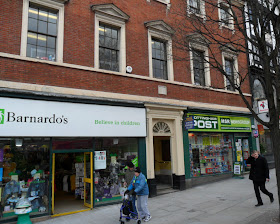On the
other side of the world (in northern New South Wales) a novel has just been
published by the Australian Publisher
Zeus
Publications. Nothing newsworthy about that - yes, Australians read - but this
book is by a Nottingham-born author and it’s set it in our great city. David
Goodman, an ex-lawyer and former Nottingham High School pupil, has combined his
lifelong love of history with his penchant for storytelling, to write
In Lud’s Name.
Here’s the blurb:
It is the second decade of
the Nineteenth Century in early Industrial Revolution Nottingham. The emerging
hosiery industry is the only means of livelihood for hundreds of refugees from
the surrounding agricultural villages who have fled to the town in search of a
less hazardous way of life.
They are herded into
hastily-built constructed slums, and grudgingly paid subsistence wages for a
skilled product which is funding several private fortunes among the more
wealthy entrepreneurs.
The terms if international trade,
blighted by the Napoleonic Wars, render the hosiery product hard to sell in
Europe, while at the same time forcing the domestic food prices ever upward.
Starvation and disease are rife in the festering courtyards of the resentful
workers, who are desperate for a champion to their cause.
Into the tinderbox someone
throws a lighted fuse called Ned Lud…
The Foreword:
The term “Luddite”
has acquired a popular meaning not justified by history. Ask most people whom
they believe the Luddites to have been, and their response will be something
along the lines of ‘a bunch of violent Lefties from somewhere in the north of
England who opposed technical progress, and smashed new machines which were
throwing them out of work’.
Wrong on every count
except the use of violence. But it was a violence born of desperation which
drove them to smash, not new machines which threatened their livelihoods, but
the very machines on which they had been earning their livings for at least a
generation. That desperation arose, not from any technical threat, but from
hunger, disease, and wretched living conditions, in the face of the seeming
indifference of those whose apparent prosperity they were feeding. But the very
entrepreneurs whose working capital went under the hammer, axe and tinder box
almost nightly for two turbulent years were themselves victims of the same
economic downturn, and were financially powerless to relieve the sufferings of
their workers.
I have set out to
depict what little is known of the actual events from both sides of the
economic divide, through the eyes of two notional families whose mutual regard
and respect for each other brings them nothing but tragedy. The main characters
are obviously fictional, but the dates are accurate, and most of the background
is historically sound. There really was a
Town Clerk called George Coldham, and the Home Secretary of the time really was a man named Richard Ryder. The
maiden speech of Lord Byron during the House of Lords debate on the Framework
Bill is reproduced word for word.
There also really was
a man named Gravener Henson, and one theory puts him very close to events. We
shall never know for certain, because the real Luddites kept their identities
as well hidden from the modern historian as they did from the authorities at
the time. Whether or not one can conclude that they came from ‘somewhere up
north’ depends upon where one is standing. They came from Nottingham, an
English Midlands town famous mainly for Robin Hood and pretty girls. Also for
its lace industry, made pre-eminent in the world by the men and women on whose
behalf this story is told, in an attempt to set the record straight.
David Goodman
A Sample:
A rat foraged hopefully through a mound of rotting garbage, nose
twitching, its writhing tail flicking a channel through the slime. Tommy
Slack’s boot missed it by half an inch, and it shot for the sanctuary of the
open drain which ran through the centre of the greasy, unpaved, inner
courtyard. Tommy grinned, and completed the short journey from the communal
corner privy to the single low door of Number 7.
The fog which had hung
since daybreak over the River Leen, fully a hundred feet below the huddled
slums which perched on Drury Hill, had since crept cautiously up Narrow Marsh,
searching out the overcrowded courts and narrow alleyways. By two o’clock it
had already drifted into Tanners Yard, and now – a few minutes short of three –
was snaking triumphantly around the roofs of the workmen’s dwellings. These
were only a generation old, but their unscrupulous developers appeared to have
opted for instant slums, laid out in cramped back-to-back rows around the courtyard.
It was October 22nd,
1809, and Old Joe Slack was to be buried.
Tommy lifted the latch
and rejoined the company. Many had gathered to pay their last respects to Old
Joe, and the cramped all-purpose room was rank with the steam of cold damp
clothing on marginally warmer bodies. In the upper room lay Old Joe himself, on
a borrowed trestle, in a basic coffin donated by the church. A modest enough
arrangement in itself, but no-one in the Yard could recall a neighbour going
off in a coffin. Nor would he have done, in all probability, had the entire
family, Joe included, not been regular worshippers at that same church.
From time to time, a
mourner would mount the rickety stairs to the upper room, and gaze down
wistfully at their former neighbour. Grizzled, shrunken, and even greyer in
death than he had been in life, Joe Slack had lived to be 62, a feat of
endurance for someone who had worked a stocking frame for nigh on thirty years.
It was a meet time for
reflection, and Nathan Slack was ever one for that. He’d been just short of his
thirteenth birthday when his father had led the entire family off the fields of
Edwalton into the town parish of St Mary’s, newly swollen by the pre-war
expansion of the Nottingham hosiery trade. The parish had been overcrowded even
then, and Nathan’s mother had been the first to succumb to the unhealthy fog
which rose almost daily from the river, almost as if to shroud the squalor
above. At the age of thirty-six, she’d left a husband and three children – a
common enough loss, and Old Joe had battled on.
In Nathan, Joe had
raised a son in his own image, a strong and willing worker who’d helped to
support the family through long hours at the frame. At the age of fourteen,
Nathan’s sister Nellie had died of the fever, and at seventeen, his younger
sister Rose had perished under the wheels of a coach and pair on Short Hill.
Joe and Nathan had lived alone until Lily came along.
It was Lily who broke
the spell, a firm hand on Nathan’s arm.
'It’s near time – best
see to the carryin’ party.’
Nathan smiled proudly
as he watched her bustle back into the company; even at his own father’s
funeral, she was taking charge. They’d managed well enough these past sixteen
years, and he wouldn’t have wanted her any other way.
The flickering glow
from the oil lamp suspended by a hook from the ceiling – essential all day
during the winter months – picked out the silver in her auburn hair, tied back,
as ever, in a neat bunch at the nape of her neck. She was only of average
height for a woman of those times, but even so, over the years, the low ceiling
had trained her to an instinctive stoop. Her once-slender figure had swollen
with rough housework and childbirth, and their latest – surely their last? –
showed only modestly beneath her coarse-cloth apron. Perhaps this one would
survive, making it four. Those stillborn had all been boys, and Old Annie had
divined a girl this time, not that Lily believed in ‘all that tomfoolery’.
Nathan was drawn back again to the business in hand as Tommy sidled
alongside him.
‘There’s still time to
change it, Da – Will’s complainin’ as ’is back’s bad.’
Nathan sighed with
irritation.
‘Yer not goin’ in the
carryin’ party, and there’s an end on it. Yer place as eldest boy is with yer
Mam and me, up the front. There’s plenty more can carry the coffin.’
‘But Da…’
'I’m tellin’ yer, lad – it’s all settled. Now
go an’ see after the guests, like yer Mam asked yer.’
Tommy snorted away, and
Nathan reminded himself for the tenth time that it was the right decision. At
fifteen, although tall for his age, Tommy was probably too young to be a
bearer, and if he gave in to Tommy, he could hardly refuse his brother Matthew,
and thirteen was definitely too
young. It was a pity, all the same – they’d both thought the world of their
grandfather.
As usual, it had been
Lily who’d had the last word.
‘I’m not ’avin’ folks
sayin’ as no-one else’d tek him,’ she’d announced flatly, ‘and anyroad, we must
walk as a family, and our place is up the front.’
By way of compensation,
Tommy had been placed in charge of the meagre supply of ale, to fortify the
mourners against the dreary uphill trudge to the burial ground.
Nathan pushed through
the throng to the foot of the stairs, signalling to certain of the men as he
went. Once upstairs, Ben Pilgrim secured the lid with a handful of nails, then
helped the other three pass the coffin down to the room below, where it was
lowered reverently to the ground. The four men then paused nervously, waiting
for the word.
‘Ready, then? Mind the
balance as you go. You’ll be right enough, Will?’
Will Draycott grinned
toothlessly.
‘Reckon that lad o’
yourn’s bin tellin’ whoppers again. Me back were a bit sore yesterday, that’s
all. It’ll tek no gristle ter lift poor old Joe, anyroad.’
Relieved to have the
final decision taken out of his hands, Nathan caught Lily’s eye across the
room, and gave her a silent nod. Lily slipped off her apron, and took hold of a
ladle from the hob-rack. As Joe’s coffin was lifted effortlessly onto willing
shoulders on a whispered command from Nathan, she struck the ladle against the
pot which hung over the empty hearth.
An instant silence
descended, and Nathan stepped self-consciously towards the door, followed by
the coffin and its four carriers. The company parted down the middle as Nathan
led them out, crouching to clear the low lintel as they moved out into the
Yard. The rest followed, and as the full procession formed up outside, Lily
dropped the latch behind the last of them. She then came round to stand
alongside Nathan at the head of the line, their two sons immediately behind
them as instructed, and young Ruth holding onto Lily’s right hand. There was a
moment’s hesitation, and then they moved off at what they hoped was a suitable
funereal pace.
The fog now engulfed
the whole of St Mary’s, swirling and twisting in unchallenged eddies wherever
its whim decreed. The measured tread of the mourners rang hollowly against the
crumbling archway exit from the Yard, as they passed under it and out onto
Drury Hill. A carriage clattered somewhere above them, and they braced
themselves against the cold dank air and the steep climb up to Weekday Cross.
They turned right at
the Cross, and were in High Pavement, stepping at an easy pace for the sake of
the women and children, a humble cortege of some forty common people. High on
their left rose the four-storeyed mansions of the well-to-do – the
manufacturers, tradesmen, frame-owners and suchlike. To their right, the High
Pavement Chapel and School, the Shire Hall and the Town Gaol, perched
menacingly on the edge of the steep cliff which fell sharply down to the Leen.
Beyond the narrow
river, on the flat plain which gave access to the wider Trent, of which the
Leen was merely a polluted tributary, lay the open meadows of the East and West
Crofts, barren now, but in summer months the favoured picnic grounds of the
workers of St Mary’s. A chance to fill their lungs with God’s good air, and
their tiny back-to-back houses with daffodils and crocuses. Today, the Meadows
lay somewhere behind a heaving grey wall, and not even the wealthy, from their
servants’ attic rooms, could buy a glimpse.
The occasional
passer-by scurried in and out of the fog, and Lily pressed close to Nathan, her
left arm in his right, seeking his warmth and his reassuring presence. He
recalled how she’d shared his arm all those years ago, as they’d left the Sion
Chapel, man and wife in the sight of God. Further back still, how she’d first
come into the Yard, a bundle of starved rags pursued by the Town Watch.
It had been cold then
too, a wicked November night with clear skies and a cruel early frost. The hue
and cry had risen on Drury Hill, and had followed her as she’d scampered for
refuge into Tanners Yard, a grimy scarecrow of a girl. Nathan, then a robust young
man of twenty-two still grieving for the tragic loss of his sister Rose, had
been out in the courtyard, chipping the first hard ice of the year from the
doorway of Number 7. Lily had raced behind him and across into the corner
privy; seconds later, two burly officers of the Watch had skidded under the
archway and into the Yard, each holding aloft a search lantern.
‘You! Seen a girl come
in ’ere?’
Nathan disliked the
Watch, and particularly Watt Griffin.
‘They come in and out
all the time – why, you lost one?’
Griffin scowled at
Nathan, then scanned the Yard, his lantern held as high as his short arms and
legs permitted. His suspicious eyes fixed on the privy.
‘What abart in there?’
‘Have a look for
yerself, but don’t blame me if Scuff Needham pulls yer ears off.’
‘Scuff’ Needham was a
fearsome size, and none of the Watch had ever taken him. Griffin was not in the
mood for pointless heroics, not even with Collins to assist. With a final glare
at Nathan, he swaggered out of Yard, closely followed by a relieved colleague.
Nathan waited silently until the privy door opened a few cautious inches.
‘They’ve gone, lass –
nowt to fear.’
She’d have slipped back
out of the Yard, but Nathan intercepted her and held on firmly to her right
arm.
‘Not so fast, young
lady. Now then, you bin stealin’ or summat?’
Proud eyes had burned
into his.
‘That’ll be the day as
Lily Parker steals – and I’ll thank yer to tek yer gret hairy fist off me arm!’
‘I’ll do that when I’m
good and sure why yer ’ere. Da!’
Old Joe had shuffled
carefully out over the icy threshold in answer to Nathan’s summons, and had
surveyed the young girl with a wisdom born of experience.
‘Yer can let ’er go,
Nathan – anyone can see she’s got nowhere to run to.’
‘I reckon she’s bin
stealin’ or summat.’
‘An’ I reckon yer
wrong. Anyroad, fust thing is to get summat warm into ’er. She’s shiverin’ fit
ter bust.’
Nathan looked down at
her more gently.
‘What d’yer say, lass?
Like summat ter eat?’
Temptation and
suspicion fought each other in both her face and words.
‘I’ll not lie with yer,
if that’s what yer think.’
‘That yer’ll not lass –
leastways, not smellin’ like that.’
He’d had to let go of
her as she lashed back at him with an outraged fist.
It had taken many days
of gentleness to allay her suspicions, and at first it was only Old Joe who could really set her at
ease. Her story was by no means novel.
The oldest daughter in
a family of seven born to a drunken, itinerant tinker and his timid,
downtrodden wife, she’d stuck with the beatings, abuse and humiliation for sixteen
years, for the sake of the mother and family she’d adored. Her mother had died
the previous Christmas, and all the children but Lily (who was above the age of
child charity) had been consigned to the Leicester Poorhouse. She’d followed
her father under threat of further violence, and in the waning hope that love
and devotion might even yet be his salvation.
Until a British publisher picks up on this book you’ll have to visit Zeus Publications or Amazon.com to find a copy, but I’m told
an ebook version is on its way.




























